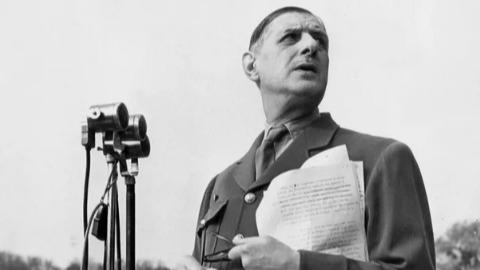A keen observer of French political life and columnist for Le FigaroVox, Maxime Tandonnet has published André Tardieu. The Misunderstood (Perrin, 2019) and Georges Bidault: From the Resistance to French Algeria (Perrin, 2022). He teaches immigration and nationality law at the University of Paris XII.
In this period of profound turmoil and bloodshed, both domestically and internationally, the 53rd anniversary of General de Gaulle's death was an opportunity to revisit the message of this extraordinary figure who now figures in the pantheon of heroes of our national history. Countless speeches, messages and ceremonies have been dedicated to him, from which some strong ideas emerge. The appeal of June 18, 1940, at the heart of the tributes paid to him, remains a symbol of hope and national resurrection when all seems irretrievably lost. It is a founding date of the French nation that deserves to be honored as much as others (May 8, July 14, November 11)...
But beyond that, what remains of Charles de Gaulle, half a century after his death? The world has undergone such transformations that it may seem illusory to refer to a character, no matter how heroic, who lived in a completely different universe. De Gaulle was head of government twice (1943-1946, then 1958) and head of state for ten years (1959-1969), at a time when the global world of the Internet did not yet exist, when Europe and the planet were divided into two ideological blocs of equivalent forces (the Cold War), before the emergence of China and India as great powers and Islamist terrorism did not represent the supreme threat... He knew France before the collapse of educational standards, the emergence of the multi-cultural society, the industrial and scientific erasure, in a distant time when it was situated, in terms of economic power, on an equal footing with Germany...
Read alsoNobody's Man, by Jean-Luc Barré: Charles de Gaulle before the Liberation
"Everyone is, has been or will be a Gaullist," the General predicted. Today, all political leaders, from one extreme point of the spectrum to the other, claim to be Charles de Gaulle. "General de Gaulle, Emmanuel Macron's great inspiration" was the headline of a famous evening newspaper on June 8, 2021. "Le Pen, Macron, everyone is looking for their de Gaulle. The Head of State and the President of the RN celebrate the 80th anniversary of the Appeal of June 18, 1940 and follow in the footsteps of the man of Free France" (Les Échos 18 June 2020). Jean-Luc Mélenchon took his turn, invoking the memory of the great man to justify his remarks on Israel and Hamas: "I have expressed the constant position of our country since de Gaulle." The general's word is thus constantly invoked to justify the country's mode of government based on the "incarnation" or presidential exaltation, on the conflict between Russia and Ukraine or obviously on the tragedy of the Middle East, etc.
Contrary to legend, he was the antithesis of the logic of self-satisfied "embodiment" and self-intoxication in politics.
Maxime Tandonnet
In fact, half a century after his death, it is illusory, if not dishonest, to attribute precise thoughts to General de Gaulle on a world radically different from the one he knew. On the part of today's top politicians, this recuperation even has a sordid side. Paying homage to the General is salutary, identifying with him today is absurd. Who can know what the general would have thought of the personality and behaviour of the most obstinate in claiming him at that moment? Maybe good, or maybe a lot of bad... In fact, it is fundamentally dishonest to attribute to de Gaulle thoughts about France and the world today that he did not know during his lifetime.
On the other hand, his role model as a statesman is imperishable. It transcends time. The most formidable mistake made by the country's top leaders, opponents, intellectuals and many Gaullists themselves, is to see in Charles de Gaulle a precursor of the megalomania, narcissism, and self-dazzle that French politics has become for too long to the detriment of the general interest.
Contrary to legend, he was the antithesis of the logic of self-satisfied "embodiment" and self-intoxication in politics. François Mitterrand was mistaken in accusing him of being "a Führer, a duce, a caudillo" in his permanent coup d'état.
Read alsoYvonne de Gaulle, the discreet one, died on November 8, 1979
In truth, the General considered himself a servant of France and the French, as he proved on many occasions. As head of state, his principle was simple: he was at the service of the people. As soon as he was no longer wanted, he would leave... For him, an unpopular president was inconceivable: the people were the only sovereign. If he was dissatisfied with his president, he had to step aside. Immediately.
Thus, de Gaulle, liberator and head of the provisional government of the republic, resigned on 20 January 1946 as soon as the "parties" hindered his action. Under the Fifth Republic, the general's approval rating fluctuated between 60 and 80% (today, we claim victory when it reaches 28%!). However, every two years, he did not fail to solicit the confidence of the people through referendums on which he committed himself to the continuation of his mandate. And when the majority of the French voted "no" in his referendum on 27 April 1969, he immediately ended his mandate in accordance with his repeated promises.
In truth, for de Gaulle, the exercise of power was not an end in itself, the achievement of a goal of narcissistic recognition or the satisfaction of an egotistical impulse. It only made sense in the service of France and the French. And that makes all the difference.

